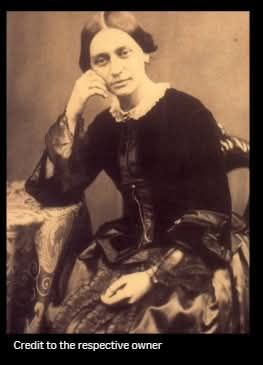Clara Schumann didn’t choose to become a musician; that decision was made by her father, Friedrich Wieck.
Friedrich was a formidable man—strict, driven, and utterly convinced that Clara could become one of Europe’s greatest pianists if shaped the right way. Music truly ran in her blood. Both Friedrich and Clara’s mother were talented pianists. Her father believed she was destined for something more, something extraordinary.
He began training her when she was just five years old. His methods were tough. She practiced for hours each day, and he also insisted she walk two hours daily to build stamina. He was controlling and sometimes verbally harsh. “You wretch, you scoundrel, is this how you try to please your father?” he once shouted at her brother, who was also under his rigorous training.
But it was always clear that Clara was the star. And Friedrich’s strict methods did bring success.
Clara gave her first public performance at nine years old. By sixteen, she was a sensation across Europe. Critics praised her playing for its technical brilliance and emotional depth. There was something in the way she performed that made listeners feel as if they were invited into the deepest corners of her heart. Applause followed her everywhere. Yet, even as she rose to stardom, her world remained tightly controlled, with her father managing the details of her career and public image.
He also tried to control her personal life. Clara had developed an interest in Robert Schumann, one of Friedrich’s piano students boarding in their home. Robert was older, musically gifted, but still finding his path. Their relationship grew from friendship to admiration, and then to something more.
However, Friedrich opposed their relationship. He may have feared losing Clara’s talent to domestic life, or perhaps the loss of control over her. Or maybe he saw something in Robert—his melancholy and instability—that Clara could not yet fully understand.
But the couple was determined. “Your plan seems risky to me, but a loving heart pays little heed to danger… I’ll show my father that a youthful heart can also be steadfast,” Clara wrote to Robert. They took their case to court and won. In 1840, at twenty-one, Clara became Clara Schumann.
Their marriage would be filled with love and music, but rarely ease. Clara gave birth to eight children and often managed the household alone while Robert composed and performed. Even with all her duties, she remained his fiercest supporter. She reassured him when he doubted himself and carried him when he broke down. And somehow, in the midst of it all, she still found time to compose and perform, though there were periods, sometimes years, when she did neither.
Yet despite her loving support, Robert’s mental health slowly and painfully declined. In 1854, he attempted suicide and was committed to an asylum. Clara, pregnant with their last child, was forbidden to see him for two years by the doctor’s orders. Though the asylum was progressive for its time in patient care, doctors believed family visits could destabilize his fragile state. When she was finally allowed to visit, just days before his death, he barely recognized her.
“Today I saw him for the last time; I lay a few flowers on his brow so that he take my love with him,” she wrote shortly after his passing.
Clara was then thirty-five, widowed with seven children, and had already endured enough grief for many lifetimes. But she did not break under the pain. She had her children to support, and she had her love of music.
She returned to the stage and became one of the most respected pianists of her era. Her interpretations of Bach, Beethoven, and Brahms helped shape the modern piano repertoire. She introduced audiences across Europe to works that would become foundational, and her own playing became a standard of balance, refinement, and emotional honesty.
In time, Clara also became a revered teacher. Students came not only to learn piano but also to learn integrity through music. One unofficial student was Brahms, who was in his early twenties, just beginning his career. He admired her deeply. Their friendship, possibly more, lasted for decades. In one letter, he wrote to her:
“How fortunate you are, or, I should say, how beautiful, how good, how right! I mean that you bear your heart as a conscious possession, securely; whereas we are obliged every minute to conceal ours. You see everything so warmly, with such beautiful serenity, just like a reflection of yourself; and then with the same serenity you give unto each his due.”
Clara played her last concert in 1891 at the age of seventy-one. She passed away five years later, having spent over sixty years devoted to music.
